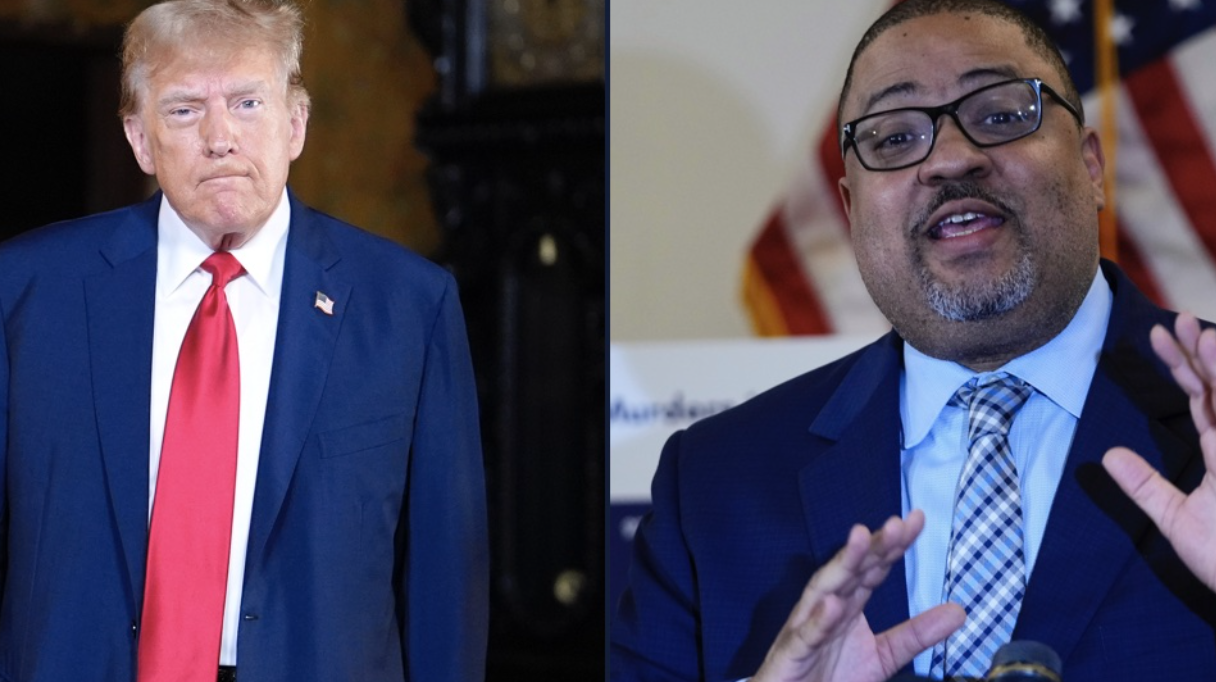Trump Moves To Transfer Bragg Case To Federal Court Before Sentencing

Former President Donald Trump's legal team is seeking to have his New York criminal trial moved to federal court, arguing that he has been subjected to "constitutional violations" stemming from proceedings they believe conflict with the U.S. Supreme Court's recent decision on presidential immunity.
In a filing submitted on Thursday, Trump's attorneys emphasized that the "ongoing proceedings will continue to cause direct and irreparable harm to President Trump—the leading candidate in the 2024 Presidential election—and voters located far beyond Manhattan."
They further stated, “And an entirely unjust sentencing is currently scheduled to occur on September 18, 2024, which could result in President Trump’s immediate and unconstitutional incarceration and prevent him from continuing his groundbreaking campaign,” as reported by Fox News.
To overturn his conviction, Trump's legal team argued that “Post-trial removal is necessary under these circumstances to afford President Trump an unbiased forum, free from local hostilities, where he can seek redress for these Constitutional violations.”
In May, Trump was convicted on 34 counts of first-degree falsification of business records, relating to payments made to adult film star Stormy Daniels after an alleged affair. This verdict followed a six-week trial initiated by Manhattan District Attorney Alvin Bragg's investigation into supposed hush money payments made prior to the 2016 presidential election.
Critics of the trial cited various anomalies, contending that Bragg essentially fabricated felony campaign finance charges. However, Trump's legal team noted that his predecessor, along with the U.S. Justice Department and the Federal Election Commission, had found no grounds for charges against the former president.
In their filing with the U.S. District Court in Manhattan, Trump's attorneys asserted that Bragg's office “violated the Presidential immunity doctrine in grand jury proceedings, and again at trial, by relying on evidence of President Trump’s official acts during his first term in Office.”
They added, “The U.S. Supreme Court recently ruled that these types of violations threaten the structure of the federal government and the ability of future Presidents to carry out their vital duties in the way the Framers intended.”
The filing also noted, “In an opinion that became final less than 30 days ago, the Supreme Court held that President Trump is entitled to immunity from criminal prosecution for his official acts, and — as particularly relevant here — that prosecutors may not use official-acts evidence in connection with a prosecution that they claim arises out of unofficial conduct.”
Steven Cheung, a spokesman for Trump, stated to Fox News Digital on Thursday, “The Manhattan DA’s Witch Hunt, which violates many provisions of the United States Constitution and is crushed by the Supreme Court’s historic decision on Presidential immunity, has to be removed to federal court and summarily dismissed.”
Back in July 2023, a federal judge had dismissed a prior attempt by Trump to relocate the case from a New York state court, ruling, “Hush money paid to an adult film star is not related to a President’s official acts.” The judge also noted that it “does not reflect in any way the color of the President’s official duties.”
However, this ruling came before the Supreme Court's immunity decision and before Bragg's team relied on certain witnesses and evidence from Trump's presidency to secure his conviction.
Earlier this week, Bragg submitted a motion indicating that he would not oppose a request by Trump’s attorneys to delay the sentencing, initially scheduled for Sept. 18.
“The People defer to the Court on the appropriate post-trial schedule that allows for adequate time to adjudicate defendant’s [presidential immunity] motion while also pronouncing sentence ‘without unreasonable delay,’” prosecutors wrote, according to the Washington Examiner.
The filing also mentioned, “The Supreme Court’s recent decision did not consider whether a trial court’s ruling on that distinct evidentiary question is immediately appealable, and there are strong reasons why it should not be. Nonetheless, given the defense’s newly-stated position, we defer to the Court on whether an adjournment is warranted to allow for orderly appellate litigation of that question, or to reduce the risk of a disruptive stay from an appellate court pending consideration of that question.”